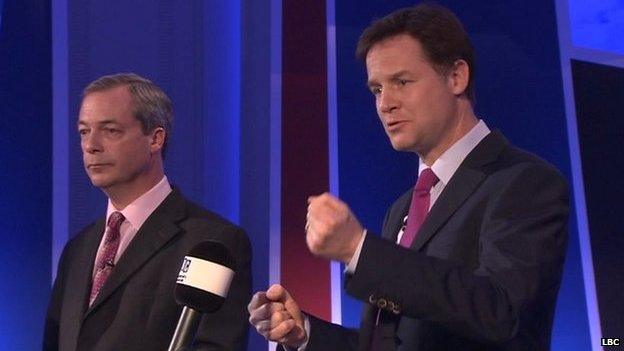Scottish Lib Dem conference: Clegg hammers 'sunshine strategy'
- Published
Clegg speech makes badgers gaffe
They are perpetually hammering their opponents or hammering home the truth to a reluctant, neglectful electorate.
When not hammering, they are to be found "cracking down": on crime, the causes of crime and other manifestations of our troubled society. Endless hammering and cracking down. It must get dreadfully tiring.
But today in Aberdeen Nick Clegg went a little further. He told his party's Scottish conference of his predilection for hammering badgers. It was too much. How would the delegates respond? Would they rush the stage? Would they declare a motion of no confidence?
Would they go into emergency session with a group hug and a rendering of "We shall overcome" in solidarity with the beleaguered badgers? Would they throw shoes - or perhaps sandals - in protest?
Of course, they did none of these things - because Mr Clegg hurriedly corrected himself. Badgers were safe. Cherished, indeed. He had meant to say he liked "hammering out the Budget" with his Conservative counterparts in coalition, in order to derive benefits for the hard working members of our society.
It was a quick exit - and I think he got away with it, mostly. One or two in the audience, the more militant badgerites, still looked sceptical.
But their disquiet gradually eased as Mr Clegg moved to his main message. This concerned the need for the supporters of the Union to coalesce behind a coherent alternative offer to counter independence.
Talking up Union
This forms part of the Sunshine Strategy disclosed on this site earlier this week. Instead of just bashing the Nats - or "hammering" as Nick Clegg would undoubtedly advise - the notion is to accentuate the positive, to talk up the benefits of Union.
In line with the strategy, Mr Clegg said he disavowed the idea of comparing the SNP directly with UKIP. Very big differences. Not really the same at all. Having declared that it would be stretching things to make such a comparison, Mr Clegg of course proceeded to do just that.
Both parties apparently wanted "to bring an end to a partnership between nations that has been forged over time and serves us well". He was speaking of two unions, that of the United Kingdom and that of the European Union.
Now Mr Clegg took part this week in a broadcast debate with Nigel Farage of UKIP. So perhaps UKIP was still on his mind. But Chief Secretary to the Treasury Danny Alexander picked up the theme. He had, he said, been giving some spin after the Clegg/Farage conflict. Mr Clegg, he said, had done rather well.
"Clear, authoritative, passionate, relentlessly exposing the flaws in our opponents' case - just the way to defeat a smirking nationalist who will say absolutely anything to get his way." In case his audience had missed the point, perhaps blinded by the Sunshine Strategy, Mr Alexander added: "Scotland take note."

Sunshine, it seems, has its limits. Still, churlish to complain. More than one delegate said to me that it remained entirely legitimate to continue to point out what they believe to be fundamental flaws in the independence offer. For example, Mr Alexander insisted once more that a sterling zone would not happen. (His nationalist critics, of course, dissent.)
There was substance, too, in a relatively truncated speech by Mr Clegg. The federal leader urged supporters of the Union to work together in forging an alternative to independence, which involved more powers for Holyrood. The stakes, he said, were too high "for our parties to succumb to the usual tribalism or squabbling now".
There must be, he said, a united front. Snag in that idea is that there are pressures pulling the other way. Firstly, is there sufficient time to devise such a common front - while simultaneously fighting the referendum? Secondly, the parties do not currently agree - the LibDems for example favour Holyrood controlling a majority of the taxes required to raise its revenue while Labour has calculated its offer at 40% (others reckon it's less.)
Thirdly, there is the small matter of the UK General Election next May. Elections encourage parties to compete with each other in making offers to the voters. They tend to involve tribalism and squabbling, by definition.
Spreading sunshine
Still, the talk at the conference centre in Aberdeen is of forging as much consensus as possible ahead of the referendum - without necessarily prescribing all the detail. With the LibDems playing a significant role in brokering the deal.
That, certainly, was the prospectus advanced by the Scottish leader Willie Rennie when I interviewed him for our webcast. (Catch it online. It repays inspection.)
In that same interview, Mr Rennie declared that a Yes vote in the referendum was a "distinct possibility." That was why, he argued, it was important for the pro-Union sides to work together to project a positive message. To spread a little sunshine.
And Mr Clegg? He was last seen heading in search of a badger to hug, veterinary advice notwithstanding.